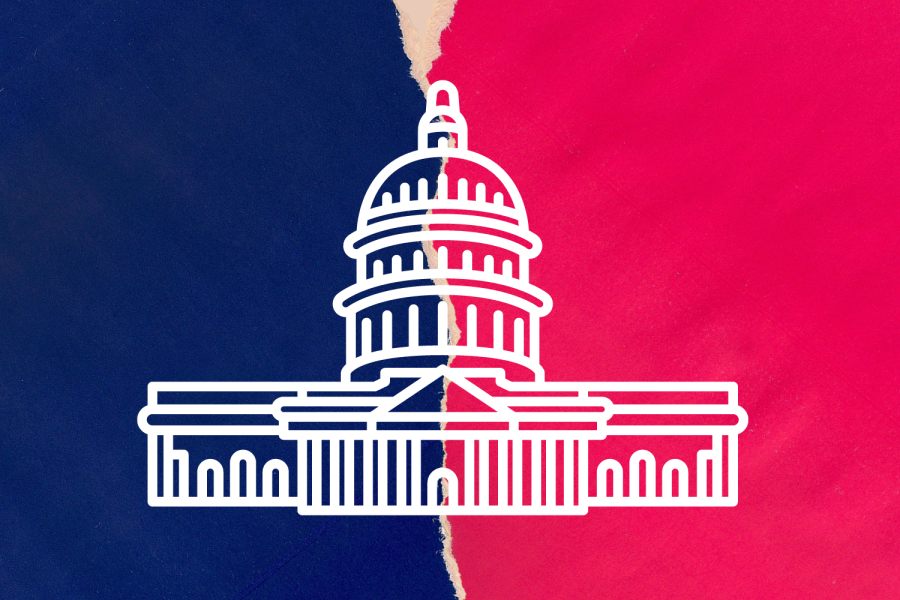A Democratic Senate. A Republican House. A Democratic presidency.
A divided national government.
A disunited government, for some, is synonymous with a lack of progress. It’s a standstill in the face of a country split into blue vs. red.
According to a survey from Pew Research Center, 61% of U.S. voters believe Republican and Democratic leaders will be unsuccessful at passing policies in the following two years.
“The degree of inter-party cooperation nowadays is much lower than in the 20th century. I suspect there will be a considerable degree of gridlock,” said Lee Miller, a professor of political science at the College of San Mateo.
Despite the divided government, parties will have to adopt specific strategies to accomplish their goals.
According to Alan Yan, a doctorate student at the University of California, Berkeley, the House has leverage over the presidency and the Senate. To counteract, the Democrats will likely govern through executive action to advance their political agenda. The Democrats may also alter their bills to pass them through the legislature.
“I don’t think there are many bills we can expect the Democrats to pass through a Republican-controlled House. If the Democratic Senate passes anything on its agenda, they’ll have to water the bill down dramatically,” Yan said.
A critical factor dictating how the next two years will pan out remains undecided: the Speaker of the House.
One possible candidate is the current house minority leader, Kevin McCarthy. On Nov. 15, McCarthy was nominated with a vote of 188 – 31 by the Republican House. He needs 218 out of 222 votes to win on Jan. 3. However, controversy within the Republican party over McCarthy may cost them during the next two years, according to Yan.
“McCarthy may struggle to keep the Republican caucus united enough to pass legislation, given how the right-wing Freedom Caucus held up legislation during the last Republican majority,” Yan said.
The Freedom Caucus is the farthest-right bloc of Congress. McCarthy’s relationship with this bloc has been strained since 2015 when he tried to become House Speaker.
McCarthy’s previous attempts to align himself with the critical middle of the GOP conference lost him support from the Freedom Caucus.
Fast forward to 2022, the Freedom Caucus is still challenging McCarthy.
Both parties also hope to set a solid precedent for the 2024 presidential elections.
They may prioritize making their political agendas clear in Congress to build the foundations for their campaigns. According to Yan, this will likely take shape through message bills.
“The Republicans will likely try to pass many message bills that have no chance of truly passing to deliver a clear message to voters about where they stand relative to the Democrats. We saw these bills when Republicans kept trying to repeal Obamacare during the Obama administration,” Yan said.
According to Yan, stalling legislation is another way the Republicans may use their majority in the House to pave the way for the 2024 elections.
“The Republicans may be incentivized to stall all legislation the Biden administration tries to pass to embarrass the Democrats before the presidential election. During the presidential election, they could then campaign upon the Democrats’ failure to deliver policies,” Yan said.
In the past, both the Republican and Democratic parties have also approached the presidential elections this way. In particular, investigations have been used as a tactic to taint opposing candidates in the presidential campaign.
For instance, in 2011, many investigations were launched into the Obama administration. Operation “Fast and Furious,” a gun-smuggling controversy, was investigated when the Bureau of Alcohol, Tobacco, Firearms, and Explosives purposely allowed illegal gun sales hoping they would lead to key figures in the Mexican cartel.
Former President Barrack Obama used executive privilege to withhold documents from Congress concerning the operation, sparking suspicion and allowing the Republicans to blame the Democratic Party.
“If history is any guide, the Republicans will go all in for investigations to tarnish President Joe Biden before the 2024 elections, but this may not work out for them. The Republicans spent much time investigating President Bill Clinton in the 1990s, but still lost the midterms in 1998. During Obama’s presidency, they spent a lot of time with the Benghazi investigation to try to tarnish Hillary Clinton before the 2016 elections. Still, they never really found anything,” said Jarrod Harrison, a Carlmont U.S. History teacher.
When the Democrats had a House majority under a Republican presidency in 2018, they launched extensive investigations into the Trump administration, culminating in Donald Trump’s impeachment.
With the reversed congressional alignment in these next two years, Miller believes investigations will play a pivotal role.
“It would be surprising if the investigations of former President Trump and his associates did not lead to some criminal charges. As for the House Republican majority, they can be expected to investigate President Biden and his son Hunter Biden, plus other prominent Democrats,” Miller said.
Looking back to previous congressional sessions can predict how the next two years will proceed. During the 2011-2012 congressional session, which mirrors the upcoming congressional alignment, an important topic of debate was federal spending, particularly the debt ceiling, which is the legislative limit on the amount of national debt that can be incurred by the U.S. Treasury.
During the debt ceiling crisis of 2011, the House, Senate, and President had to agree to raise the debt ceiling. In the end, $2.1 trillion in cuts were made to national organizations like the Head Start programs, the FBI, and the National Institutes of Health, to compromise.
“I think the debt ceiling issues will also be a big deal in the following two years. The Republicans may want to use government funding to block the Democrats’ agenda. The real problem is that if the U.S. dramatically cuts spending or defaults on its debt, it could be enough to damage an already struggling economy. That will hurt average Americans, regardless of the political gamesmanship,” Harrison said.
The new congressional alignment will also impact the judicial branch. Biden will likely attempt to restore the balance of Trump’s conservative appointees.
“Because the Democrats have a majority in the Senate, President Biden’s judicial nominations are likely to be confirmed, as they are not subject to the filibuster, and the House doesn’t get to vote on them. I’d keep my eye on the judicial branch in terms of substantive activity. There will likely be additional controversial Supreme Court rulings from the 6-3 conservative majority,” Miller said.
The split Congress will test both parties as they fight to maintain political leverage.
“The split Congress will lead to more political gridlock and finger-pointing as both sides try to gain an advantage for the election of 2024,” Harrison said.






















